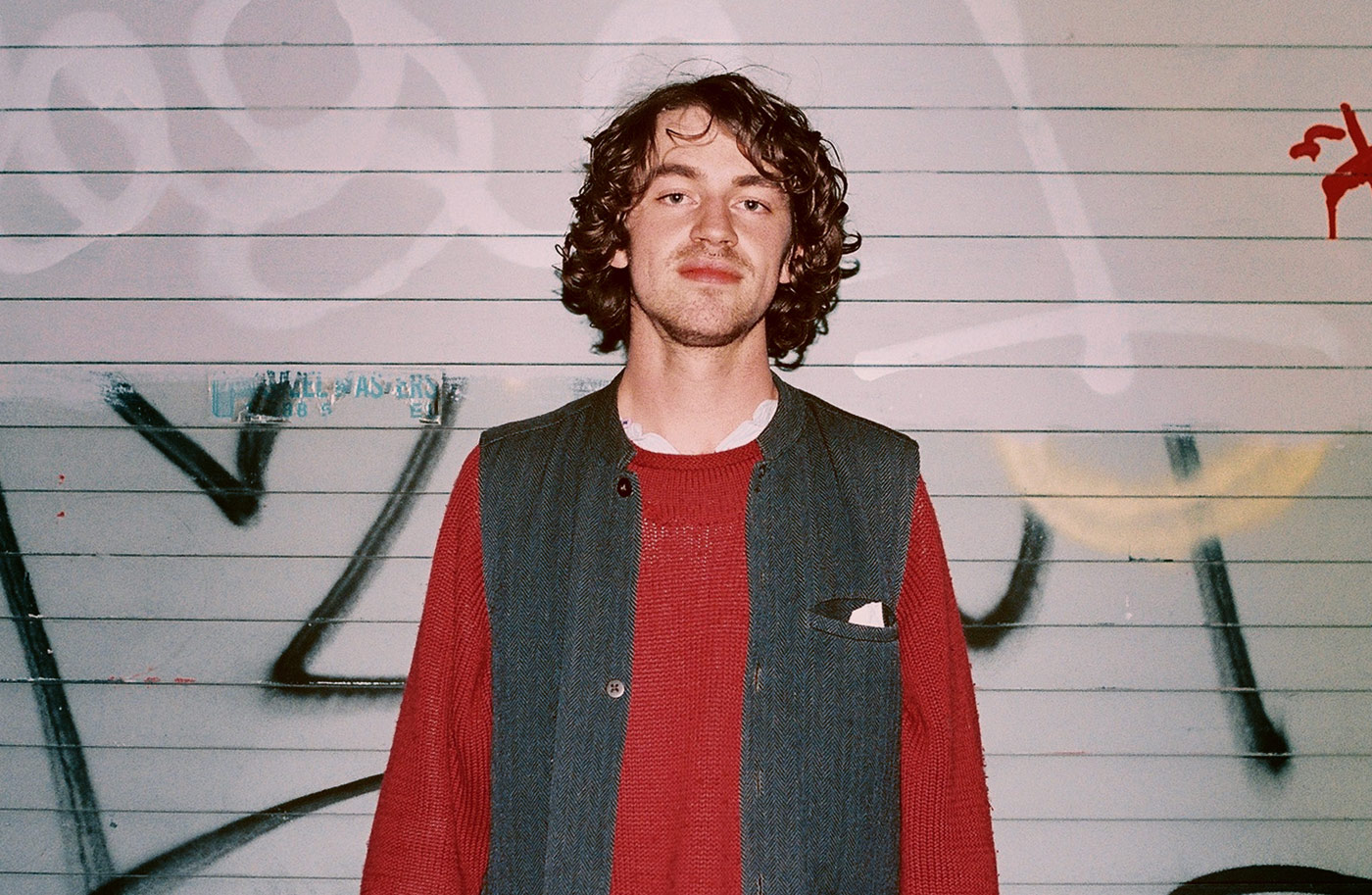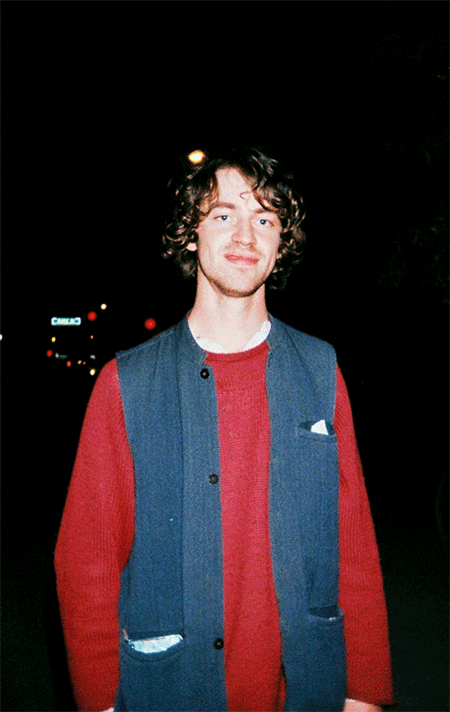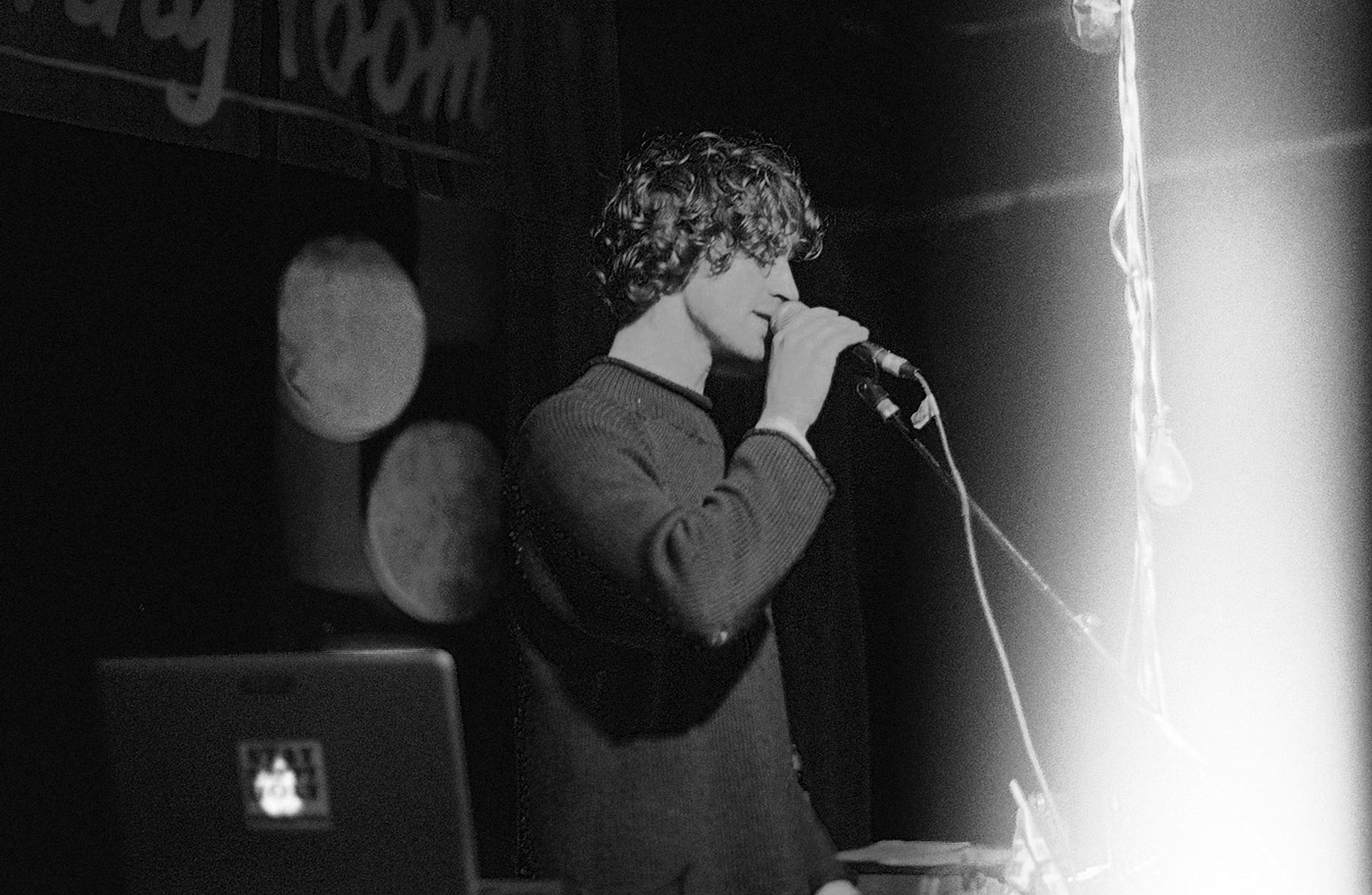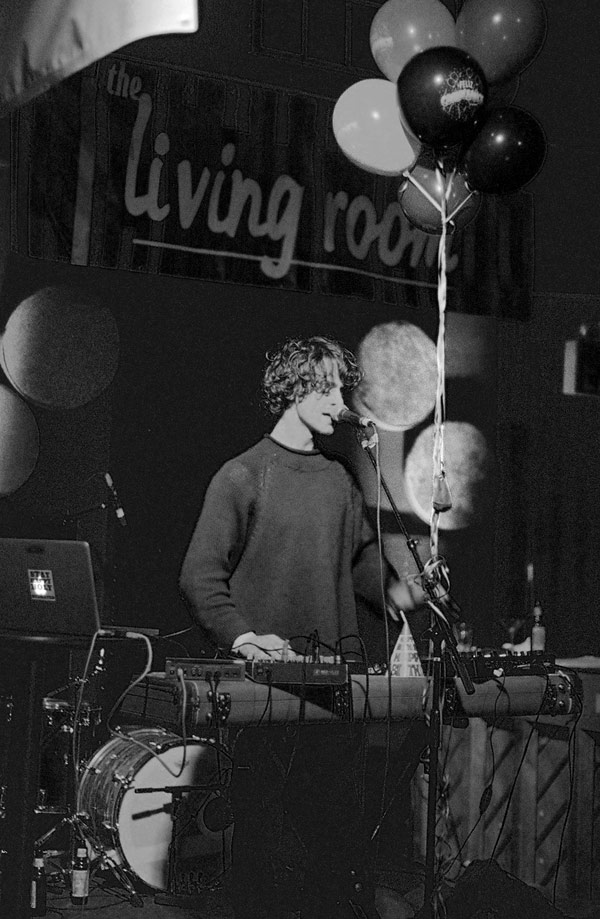Interview and Photography By Francesca Beltran
It’s 1:00 am when I arrive to the Living Room in Brooklyn ready for the last show of the night. CMJ Music Marathon was this week and even though I’ve seen countless bands by now, I’m looking forward to seeing Cosmo Sheldrake play live. To be honest, a week ago I didn’t know who this British multi-instrumentalist was; it was by chance that after a flood of emails from CMJ, I opened an invitation to Mr. Sheldrake’s show. Intrigued by the unusual name, I listened to his debut EP, Pelicans We and was immediately hooked with his odd folk melodies, which, much like his name, are unique and engaging.
As I walk into the venue, I immediately spot the tall figure wearing a red sweater under a blue vest and a party hat lit like a candle. I introduce myself, and after greeting me with a warm smile, he guides me to the second floor of the venue, where we find a quiet spot for the interview. In the twenty minutes or so that our meeting lasts, I identify the eccentric character that permeates his experimental songs; a clever man who enjoys recording sounds as a way of journaling and who combined recordings of the sun with the words of William Blake to write a solar hymn. We talk about books, pelicans, teaching music, his fascination with places and, perhaps most importantly, the beauty of nonsense.
After our conversation I go back to the main room, where I wait for his show to begin. When he finally comes up on stage at 2:30 am, I am impressed to see the young musician improvise with ease, using his voice and a loop station to create music on the spot. By the time I head home, I am certain that whatever the future holds for Cosmo Sheldrake, it will be full of delightful nonsense.
You like to record sounds from the world around you, which one is your favorite and what’s the story behind it?
Actually, it would be my friend’s little niece who’s just been born; she’s a tiny baby and she was snoring, really, really loudly. I recorded the baby snoring and it’s so sweet, so I used it as the rhythm for a piece of music, which I’m still making now. But yeah, a baby snoring.
How did you start recording sounds in that unconventional way?
I’ve always been interested in sounds and I listen to their musical potential, but this one time I went traveling and took a recorder with me; I though it would be nice to make a piece of music as a way of journaling, so I could make a piece that would sum up our trip. Each sound was a different memory or a different time and place. So that’s how I started doing it, as a way of journaling.
I read that “Solar” uses recordings of the sun, where did you get the idea?
Yeah, the lyrics come from a poem by William Blake and the main sound in there is the recording of the sun; the oscillations of the sun over a period of time and then sped up 42,000 times. I converted it into an audio frequency. It uses the sound of the sun and then the poem by Blake is kind of like a solar hymn; it’s about waking up at the dawn of day, and celebrating dawn, and casting out greed, and so it felt very solar.
Your songs have many fantastical references, where do they come from?
I’m really into nonsense literature and nonsense poetry. I’ve always been fascinated by the simplicity and playfulness of nonsense poetry and literature. And then when writing songs, there’s so many serious songs, I just thought it’d be more fun to dabble in nonsense rather that try and write something emotional.
Do you have a favorite writer or book?
I would have to give you two. Herman Hesse, “The Glass Bead Game,” which is completely amazing. And Mikhail Bulgakov, “The Master And The Margarita,” which is also a very, very good book.
And why Pelicans?
It comes from a nonsense poem by Edward Lear called, “The Pelican Chorus.” And then I guess “Pelicans We” felt like a good way of calling everyone a pelican somehow. It’s just sometimes the way that people are and move, there is something that is pretty funny about that. I don’t know, I loved the poem and I turned it into a song and then I was trying to think of a name for the EP and I just felt that Pelicans We is quite inclusive. For me pelicans have always seemed very absurd and amazing.
You like to record videos on very unusual places.
At the time I wanted to make some sort of videos to have something to show online, but I just thought it’d be so boring to just do a shot of a concert. I’m most interested in places and the nature of place as a concept, so I though it’d be fun to perform to places rather than to people and explore the nature of place. It’s also a way of documenting moments.
What’s your favorite place?
Probably Hampstead Heath in London. I grew up next to it and its 1000 acres of basically wild land in the middle of London. It’s very dear to me.
I read that you are also a music teacher, what’s the hardest thing about teaching music?
I think so much of the way that people learn is from people shoving things down their throat, you know? It’s like, practice scales, learn to read and write before you can actually speak, so it’s just hard to counteract that kind of institution, that depth of training in people. It’s just a struggle sometimes trying to convince people that that’s not necessarily the best way.
Why do you think music is important?
I think it’s a really powerful form of magic. What it can do; how it can bring people together. If it weren’t for music, the South African resistance would’ve taken a lot longer; it was through singing and dancing that people were able to unify so powerfully. I think it forms a backbone and a way of sharing time and space without necessarily having to rationalize. It’s just something that everyone needs and it’s so moving.
What would you say is the goal of your music?
To reanimate things.













